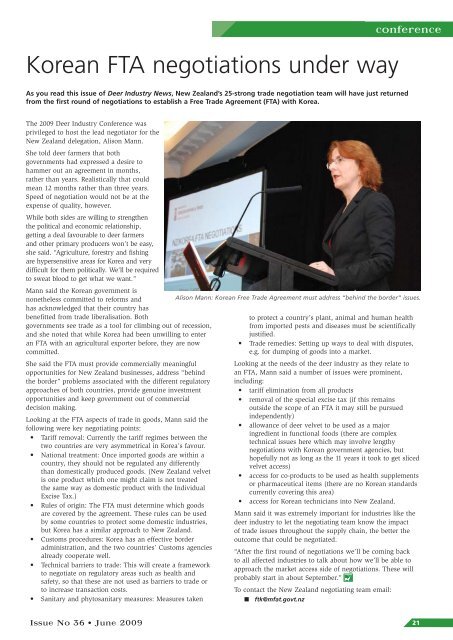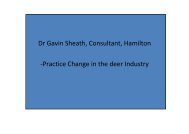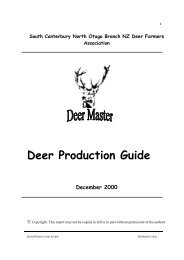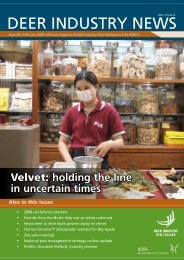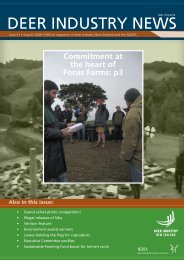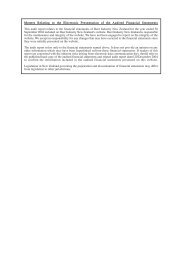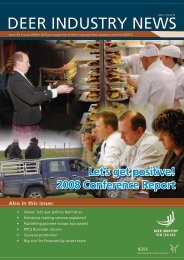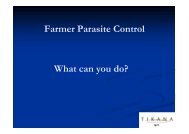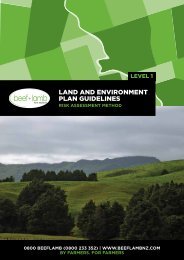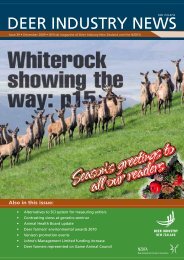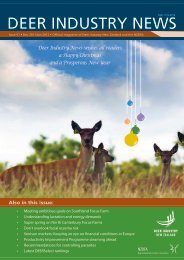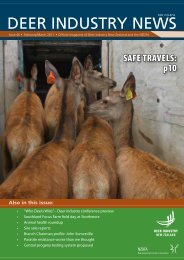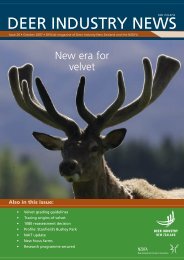Deer Industry News #36 June 2009 - Deer Industry New Zealand
Deer Industry News #36 June 2009 - Deer Industry New Zealand
Deer Industry News #36 June 2009 - Deer Industry New Zealand
- No tags were found...
You also want an ePaper? Increase the reach of your titles
YUMPU automatically turns print PDFs into web optimized ePapers that Google loves.
Korean FTA negotiations under wayconferenceAs you read this issue of <strong>Deer</strong> <strong>Industry</strong> <strong><strong>New</strong>s</strong>, <strong>New</strong> <strong>Zealand</strong>’s 25-strong trade negotiation team will have just returnedfrom the first round of negotiations to establish a Free Trade Agreement (FTA) with Korea.The <strong>2009</strong> <strong>Deer</strong> <strong>Industry</strong> Conference wasprivileged to host the lead negotiator for the<strong>New</strong> <strong>Zealand</strong> delegation, Alison Mann.She told deer farmers that bothgovernments had expressed a desire tohammer out an agreement in months,rather than years. Realistically that couldmean 12 months rather than three years.Speed of negotiation would not be at theexpense of quality, however.While both sides are willing to strengthenthe political and economic relationship,getting a deal favourable to deer farmersand other primary producers won’t be easy,she said. “Agriculture, forestry and fishingare hypersensitive areas for Korea and verydifficult for them politically. We’ll be requiredto sweat blood to get what we want.”Mann said the Korean government isnonetheless committed to reforms andhas acknowledged that their country hasbenefitted from trade liberalisation. Bothgovernments see trade as a tool for climbing out of recession,and she noted that while Korea had been unwilling to enteran FTA with an agricultural exporter before, they are nowcommitted.She said the FTA must provide commercially meaningfulopportunities for <strong>New</strong> <strong>Zealand</strong> businesses, address “behindthe border” problems associated with the different regulatoryapproaches of both countries, provide genuine investmentopportunities and keep government out of commercialdecision making.Looking at the FTA aspects of trade in goods, Mann said thefollowing were key negotiating points:• Tariff removal: Currently the tariff regimes between thetwo countries are very asymmetrical in Korea’s favour.• National treatment: Once imported goods are within acountry, they should not be regulated any differentlythan domestically produced goods. (<strong>New</strong> <strong>Zealand</strong> velvetis one product which one might claim is not treatedthe same way as domestic product with the IndividualExcise Tax.)• Rules of origin: The FTA must determine which goodsare covered by the agreement. These rules can be usedby some countries to protect some domestic industries,but Korea has a similar approach to <strong>New</strong> <strong>Zealand</strong>.• Customs procedures: Korea has an effective borderadministration, and the two countries’ Customs agenciesalready cooperate well.• Technical barriers to trade: This will create a frameworkto negotiate on regulatory areas such as health andsafety, so that these are not used as barriers to trade orto increase transaction costs.• Sanitary and phytosanitary measures: Measures takenAlison Mann: Korean Free Trade Agreement must address “behind the border” issues.to protect a country’s plant, animal and human healthfrom imported pests and diseases must be scientificallyjustified.• Trade remedies: Setting up ways to deal with disputes,e.g. for dumping of goods into a market.Looking at the needs of the deer industry as they relate toan FTA, Mann said a number of issues were prominent,including:• tariff elimination from all products• removal of the special excise tax (if this remainsoutside the scope of an FTA it may still be pursuedindependently)• allowance of deer velvet to be used as a majoringredient in functional foods (there are complextechnical issues here which may involve lengthynegotiations with Korean government agencies, buthopefully not as long as the 11 years it took to get slicedvelvet access)• access for co-products to be used as health supplementsor pharmaceutical items (there are no Korean standardscurrently covering this area)• access for Korean technicians into <strong>New</strong> <strong>Zealand</strong>.Mann said it was extremely important for industries like thedeer industry to let the negotiating team know the impactof trade issues throughout the supply chain, the better theoutcome that could be negotiated.“After the first round of negotiations we’ll be coming backto all affected industries to talk about how we’ll be able toapproach the market access side of negotiations. These willprobably start in about September.”To contact the <strong>New</strong> <strong>Zealand</strong> negotiating team email:■■ftk@mfat.govt.nzIssue No 36 • <strong>June</strong> <strong>2009</strong> 21


